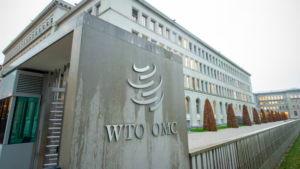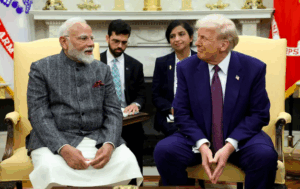As the world economy undergoes tremendous upheaval and transition, trade has reached a critical inflection point. The new emerging paradigm emerging is a shift from defending and promoting a system of a global rules-based order to manage exchange to that of economic based power platform. With China emerging as a significant economic power, the mood in global trade has shifted from collaboration to that of strategic competition.
At a fundamental level this has changed the competitive values to one finding solutions to trade issues to the use of economic coercion as a tool within the political playing field. Gone are the days when Xi Jinping mid-1990s stated to the Xinhua News Agency that there had to be clear boundaries between politics and business, arguing that one could not be an official and do business. How things have changed in the 2020s as we see all parties resort to the use of economic coercion as the strategy of choice in the current geo-political landscape.
Whilst there are nuanced differences in approach by the West versus China, its response to trade sanctions by the West has been a version of sanctions with Chinese characteristics. Labelling China sanctions as “economic coercion” is emphasising the informal nature of their economic pressure. An example of this would be China’s response to Australia by confecting regulatory blocks on the entry of Australian coal. This opaque version of sanction has taken a more sinister approach with the treatment of Lithuania through secondary sanctions i.e., blocking all imports that have any Lithuanian content. We have seen companies in Germany, such as Continental Tyres, already succumb to this pressure, pressurising the German government to coerce the Lithuanian government to change its approach to Taiwan.
What this “economic power” model ignores is that global trade is far more connected and integrated than the period when sanctions were introduced as an effective political tool to bring about change. Often economic sanctions in today’s environment tend to backfire. Perhaps another way of saying this, the more global geo-political players poke each other in the eye the more they become blind to the wider ramifications of their alleged “noble pursuits”. The maxim “cannot see the wood for the trees” comes to mind.
Looking at a couple of recent examples demonstrates there needs to be a reset in approach. Hopefully by looking at these case studies, it highlights how ineffective coercion / sanctions are in a globally connected world.
Australia can be used as an example of both sides of the same coercion coin i.e., the unexpected consequences of using coercive economic action within the globally connected economy. In both cases, the coercive action may have appealed to nationalistic fervour and have feel good nature to all parties around the bluster, but the outcomes of these actions have delivered the opposite effect.
In the case of Australian oil and gas company Woodside, the decision to withdraw from Myanmar as punishment for the military junta has two costs: one is the loss of international credibility, as not only does Australia power the Chinese economy through the supply of iron ore, but Woodside supplies 30% of its LNG production to China. The other, and perhaps greater, negative impact is to deliver Myanmar to a strategic competitor that will uphold the military junta and entrench human rights abuses in Myanmar rather than free the country up. This article will give greater substance to this geo-strategic misstep later in the piece.
Australia as the “victim” of China’s coercion
When China took to “punishing” Australia for calling for an international enquiry on Covid-19, there was an expectation by China that Australia would be brought to its senses and be more compliant with regards China’s wishes. Without going into the machinations within the political elite of Australia, it can be argued that China’s action was a spectacular own goal. As with any economic based coercive strategy, it is built on the assumption that the targeted party is overly dependent on the “enforcer” of the sanction as well as being without any other friends.
The negative unintended consequences for China are numerous. Whilst it played to China’s domestic nationalist and wolf warrior narrative, it was and still is a strategic miscalculation. Not only have the actions galvanise world opinion and undo China’s emerging favourable international image and standing, but it also caused harm to the Chinese people and industry. International focus questioned China’s intent and reliability in following rules-based order norms. Increasingly, the Australian strategy started the process of increased international isolation of China.
With China being a net importer of agriculture, energy and high end manufactured and technology products, has put severe economic strain on its economy, this strain is impacting the recently introduced dual circulation economic policy to counteract the middle-income trap by stimulating domestic consumption. With Australian coal being stranded at sea, it created an energy and power shortage at the start of winter, leaving its residents without heat and industry without power to manufacture.
Another disruptive factor resulting from this coercive approach saw the rise of internal political dissent. Led by the Shanghai faction that believes in a more open economic approach, questions are being raised about the suitability of Xi Jinping’s leadership. This in turn has led to greater purging by the CPC of dissident voices that are likely to come into sharp focus after the Winter Olympics.
From a trade perspective, Australia has been successful in finding alternative markets for their affected trade. Not only has the diversification of trade been helpful in reducing Australia’s trade reliance on China, but it has also acted as a catalyst for other nations to review their reliance on China supply chains. In essence this is speeding up the process of supply chain diversification with high end technology and high value manufacturing creating a wave of manufacturing relocation. In turn, this shift has exposed key vulnerabilities to China’s economy, such as access to semi-conductors and microprocessors that are key to China’s digital and technology ambitions.
Australia’s and its allies’ strategic goals in Myanmar
With Australia in the persona of woodside, moving from that of being “victim” to that of “enforcer” in Myanmar, it is likely that the opposite envisaged outcome will emerge. Australia is but a part of the international approach to the military coup in Myanmar. However, this strategic misstep is likely to deliver a significant geo-political win to China that undermines the current Western strategy in the Indo-Pacific Region aimed at curtailing the rise of China.
Giving some context to Myanmar, the lack of apparent progress in affecting change within the country, the National Unity Government (NUG) issued a policy statement in August 2021. This statement welcomed international companies withdrawing from Myanmar as an effective means to coerce Myanmar’s military junta to heel. This policy direction, lauded by inner city elites and international political activists, emboldened companies like Woodside, Total Energies and Chevron to divest from their gas and oil interests in the country.
Those applauding these companies for taking a stance for “human rights” and using informal coercion strategies to bring about change show a naivete and a lack of understanding of the geopolitical ramifications of such actions. This is particularly pertinent when considering that Myanmar holds a strategic location within a region undergoing significant economic and political realignment. This is a region that is feeling the rise of China, a decline of Western influence and increasing tensions as India and Japan respond to this significant geopolitical reset. It is also the location where the EU and the US Indo-Pacific strategic nexus is playing out.
The key economic and business decision makers in and around Yangon express disappointment. The overwhelming feeling is that the decision by Woodside is a poor one and will not facilitate a peaceful resolution to the current crisis in Myanmar. As one business leader said, “it is a reactionary decision to the crisis”.
At first glance, the position taken by international firms looks fundamentally flawed. How can they justify a decision based on “humanitarian grounds” when they continue to support trade and ties with other autocratic countries? Why is it that Woodside still engages with LNG trade with and encourages investment with China?
Did they not consider that Myanmar, in particular the military, is adept at working around sanctions and isolation? At a basic level, all this decision does is to subject seventy percent of the population to continue living in poverty. At the same time by trying to use economic coercion to bring an authoritarian regime to heel, potentially pushes the country further down the autocracy road by pushing it closer to China. In a sense, adopting a “poke in the eye” strategy has merely made the parties blind to the consequence of their actions.
Pushing Myanmar into China’s arms
The timing of this “poke in the eye until blind” approach is well timed for China. It is well-known that the relationship between the military junta and China had become strained towards the end of 2021, with some calls on China to divest. The underlying cause for this straining relationship was the slow progress being made on key Belt and Road infrastructure projects within Myanmar. Delays in Kyauk Phyu Port indicated that the relationship was fracturing. The junta needed to show some development as the economy continued to fail under their rule.
With the international community withdrawing projects has merely strengthened the hand of China in achieving concessions around investments into Myanmar. Without access to alternative sources of funding, and China’s apparent apolitical approach to investment, the Myanmar junta has little option but to entertain Chinese investment.
How does all this help China in its ambitions to be the regional hegemon and to shape economic engagement within the Indo-Pacific region? In simple terms, it addresses China’s two major weaknesses in its ambitions, namely trade / economic and energy security.
In the first place, as China and the military junta work closely on security, investment, and other matters, it gives China access to the important trade and shipping lanes in the Indian Ocean. It gives greater shipping connectivity between Kyauk Phyu, and the China controlled Hambantota Port in Sri Lanka. This eliminates a key economic and trade risk for China by providing trade and supply lines that no longer runs the risks associated with the Malacca Straits as a supply choke point. This addresses a key concern found in the CPC’s statement of intent, namely trade and economic security.
Secondly, it addresses the other key concern of China, namely energy security. Not only does Myanmar give China greater access to energy supplies out of the Middle East and Africa, but it also offers up significant oil and gas reserves in Myanmar without having to have gone through the expensive exploration and development phase. There are reports already circulating within Myanmar that China is staking a claim for these oil and gas fields that are being abandoned. With the absence of any competitors, it is almost guaranteed that China will gain greater control.
So, whilst the NUG, activist groups and governments celebrate another poke in the eye for the military junta, they have gone blind to the potential of Myanmar embedding an even stronger and more extensive form of autocracy through adopting everyday business and activity through the lens of Chinese characteristics.
What can we learn from the current Russian / Ukraine conflict?
The current sanctions being imposed on Russia and Russian entities seem to suggest that sanctions can and do work. There is however a significant point of difference between the sanctions currently in play than the traditional mercantilist approach of tariffs, banned products. Essentially what we are witnessing is a cohesive EU / US approach to effectively block Russia’s access to global markets. Blocking access to the SWIFT banking system, despite Germany’s initial reluctance, has had an immediate impact not just on Russia, but on China as well.
The way forward?
Global leaders need to reconsider adopting mercantilist style, singular economic coercion as a strategic weapon. The response to Russia has introduced another element as global trade has to complement its box of tricks that it can use to create rules based global economic order. Rather than feed nationalistic fervour, this new box of tricks needs to be formulated in such a way that facilitates sustainable economic constructive engagement. What Russia, China and indeed others are coming to realise is that trade is inextricably integrated and connected. This is a positive step that will hopefully stop us from poking each other in the eye until such time that all become blind.
Picture credits: morethanshipping.com







Be First to Comment